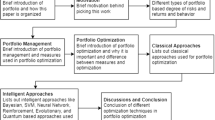Abstract
In this paper, we discuss the index tracking strategy using mathematical programming. First, we use a non-linear programming formulation for the index tracking problem, considering a limited number of assets. Since the problem is difficult to be solved in reasonable time by commercial mathematical packages, we apply a hybrid solution approach, combining mathematical programming and genetic algorithm. We show the efficiency of the proposed approach comparing the results with optimal solutions, with previous developed methods, and from real-world market indexes. The computational experiments focus on Ibovespa (the most important Brazilian market index), but we also present results for consolidated markets such as S&P 100 (USA), FTSE 100 (UK) and DAX (Germany). The proposed framework shows its ability to obtain very good results (gaps from the optimal solution smaller than 5 % in 8 min of CPU time) even for a highly volatile index from a developing country.




Similar content being viewed by others
Notes
Newspaper: Valor Economico, August 2013: http://www.valor.com.br/financas/3235752/ogx-e-acao-que-mais-ganha-peso-na-nova-carteira-do-ibovespa.
References
Aldridge, I. (2009). High-frequency trading: A practical guide to algorithmic strategies and trading systems (Vol. 459). Hoboken: Wiley.
Alexander, C., & Dimitriu, A. (2005). Indexing and statistical arbitrage: Tracking error or cointegration? The Journal of Portfolio Management, 31(2), 50–63.
Angelelli, E., Mansini, R., & Speranza, M. G. (2012). Kernel search: A new heuristic framework for portfolio selection. Computational Optimization and Applications, 51(1), 345–361.
Barro, D., & Canestrelli, E. (2009). Tracking error: A multistage portfolio model. Annals of Operations Research, 165(1), 47–66.
Beasley, J. E., Meade, N., & Chang, T. J. (2003). An evolutionary heuristic for the index tracking problem. European Journal of Operational Research, 148(3), 621–643.
Borenstein, D. (1998). Towards a practical method to validate decision support systems. Decision Support Systems, 23(3), 227–239.
Canakgoz, N. A., & Beasley, J. E. (2009). Mixed-integer programming approaches for index tracking and enhanced indexation. European Journal of Operational Research, 196, 384–399.
Coleman, T. F., Li, Y., & Henniger, J. (2006). Minimizing tracking error while restricting the number of assets. Journal of Risk, 8(4), 33–56.
Consiglio, A., & Zenios, S. A. (2001). Integrated simulation and optimization models for tracking international fixed income indices. Mathematical Programming, 89, 311–339.
Derigs, U., & Nickel, N. H. (2004). On a local-search heuristic for a class of tracking error minimization problems in portfolio management. Annals of Operations Research, 131(1–4), 45–77.
Dunis, C. L., & Ho, R. (2005). Cointegration portfolios of european equities for index tracking and market neutral strategies. Journal of Asset Management, 6(1), 33–52.
Fama, E. (1970). Efficient capital markets: A review of theory and empirical work. The Journal of Finance, 25, 383–417.
Fama, E., & French, K. (2010). Luck versus skill in the cross-section of mutual fund returns. The Journal of Finance, 65(5), 1915–1947.
Filomena, T. P., & Lejeune, M. A. (2012). Stochastic portfolio optimization with proportional transaction costs: Convex reformulations and computational experiments. Operations Research Letters, 40, 212–217.
Filomena, T. P., & Lejeune, M. A. (2014). Warm-start heuristic for stochastic portfolio optimization with fixed and proportional transaction costs. Journal of Optimization Theory and Applications, 161, 308–329.
Frino, A., & Gallagher, D. R. (2001). Tracking s&p 500 index funds. The Journal of Portfolio Management, 28, 44–55.
Gaivoronski, A. A., Krylov, S., & van der Wijst, N. (2005). Optimal portfolio selection and dynamic benchmark tracking. European Journal of Operational Research, 163, 115–131.
Gencay, R., Dacorogna, M., Muller, U. A., Pictet, O., & Olsen, R. (2001). An introduction to high-frequency finance. New York: Academic Press.
Gilli, M., & Schumann, E. (2012). Heuristic optimisation in financial modelling. Annals of Operations Research, 193(1), 129–158.
Guastaroba, G., & Speranza, M. G. (2012). Kernel search: An application to the index tracking problem. European Journal of Operational Research, 217, 54–68.
Jansen, R., & van Dijk, R. (2002). Optimal benchmark tracking with small portfolios. The Journal of Portfolio Management, 28(2), 33–39.
Jeurissen, R., & van den Berg, J. (2008). Optimized index tracking using a hybrid genetic algorithm. In IEEE congress on evolutionary computation, 2008 (CEC 2008, IEEE world congress on computational intelligence) (pp. 2327–2334).
Konno, H., & Wijayanayake, A. (2001). Minimal cost index tracking under nonlinear transactions costs and minimal transactions unit constraints. International Journal of Theoretical and Applied Finance, 4, 939–958.
Krink, T., Mittnik, S., & Paterlini, S. (2009). Differential evolution and combinatorial search for constrained index-tracking. Annals of Operations Research, 172(1), 153–176.
Maringer, D., & Oyewumi, O. (2007). Index tracking with constrained portfolios. Intelligent Systems in Accounting, Finance and Management, 15, 57–71.
Murray, W., & Shek, H. (2012). A local relaxation method for the cardinality constrained portfolio optimization problem. Computational Optimization and Applications, 53(3), 681–709.
Oh, K. J., Kim, T. Y., & Min, S. (2005). Using genetic algorithm to support portfolio optimization for index fund management. Expert Systems with Applications, 28, 371–379.
Ruiz-Torrubiano, R., & Suárez, A. (2009). A hybrid optimization approach to index tracking. Annals of Operations Research, 166(1), 57–71.
Sant’Anna, L. R., Filomena, T. P., & Borenstein, D. (2014). Index tracking with control on the number of assets. Brazilian Review of Finance (in Portuguese), 12(1), 89–119.
Scozzari, A., Tardella, F., Paterlini, S., & Krink, T. (2013). Exact and heuristic approaches for the index tracking problem with UCITS constraints. Annals of Operations Research, 205, 235–250.
Acknowledgments
The authors thank the two anonymous referees and the associate editor for their valuable comments and suggestions that greatly improved the quality of the paper. This research was funded by the following Brazilian Research Agencies: CAPES, CNPq, and FAPERGS; and Senescyt, Ecuador.
Author information
Authors and Affiliations
Corresponding author
Rights and permissions
About this article
Cite this article
Sant’Anna, L.R., Filomena, T.P., Guedes, P.C. et al. Index tracking with controlled number of assets using a hybrid heuristic combining genetic algorithm and non-linear programming. Ann Oper Res 258, 849–867 (2017). https://doi.org/10.1007/s10479-016-2111-x
Published:
Issue Date:
DOI: https://doi.org/10.1007/s10479-016-2111-x




